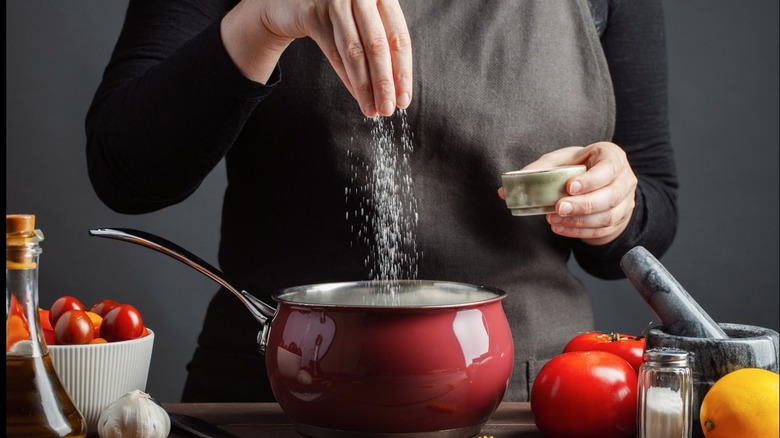What Does 'Salt To Taste' Really Mean?
Salt is the original gangster of the kitchen, and knowing how to use it properly can make or break your meal. From ribeyes to raspberries, adding salt accordingly to many dishes will ensure success and enhance the flavors of anything you're preparing. But if you've ever wondered what "salt to taste" means, here's a bit more on it.
It basically means tasting your food from start to finish, and adding salt throughout the cooking process, in order to yield a superior dish. Kitchn explains that this is a must-do step in the cooking process as salt is a big flavor enhancer that reduces bitterness and allows the natural essence and aroma of the standout ingredients to pop.
When salting to taste, it's key to remember that each step in the dish benefits from a little bit of salt followed by a quick taste to gauge how it's going. (Rather than just dumping on a pile of the white stuff and hoping for the best — that can easily make it over-seasoned.) A good rule of thumb to remember is you are tasting for the flavor of the ingredient you wish to enhance rather than trying to make a dish saltier. So, be judicious as you go and start small.
Here's how salting to taste enhances your dish
On the kitchen stage, salt plays many different roles. In baking, King Arthur Baking Company explains that salt is responsible for the many chemical reactions that aid in the overall cooking, such as the browning of crusts, getting yeast to rise and tightening gluten structures for better texture, in addition to enhancing flavor. Salting to taste can really be a next-level step for many baked goods. You don't need to taste your dough or batter, however, so reserve your salt for a garnish or to finish off your tasty treat. Adding a pinch of salt to macerating berries will kick the sweetness of the fruit up a notch while aiding in releasing their juices, says We Like 2 Cook. If you need another example of how salt boosts sweetness, look no further than the phenomenon that is known as salted caramel.
Savory dishes and sauces will also always benefit from some salty love. Fine Cooking describes how salt can deconstruct protein structures, making meats more tender, juicy, and flavorful. Sauces that are bland or bitter are often quickly fixed by a few pinches of the all-purpose seasoning. Salting savory foods to taste will intensify the flavors of your culinary creations and leave you looking like a pro. Just remember, adding salt in small increments throughout the cooking process is the recipe for success when salting to taste.

